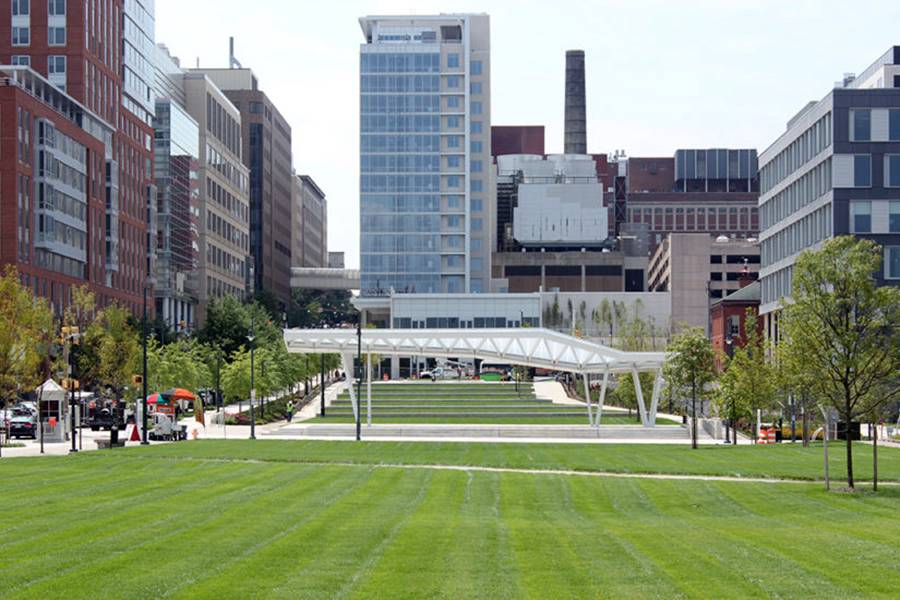As the freshly appointed head of the U.S. Department of Housing and Urban Development in the early 1990s, Henry Cisneros once attempted to tour a public housing community in Baltimore called Lafayette Homes.
The city's mayor and police, however, deterred Cisneros from going inside, telling him, "We can't guarantee your safety."
"The secretary of HUD was not allowed to go into a place where women and children were residing," Cisneros recalled Monday, citing the incident as a chief motivator for HOPE VI, the public housing program he steered under the Clinton administration that was designed to disrupt concentrated pockets of poverty.
Cisneros was among three panelists Monday at the Reinventing Our Communities conference, a three-day event organized by the Federal Reserve Banks of Philadelphia and Richmond and co-hosted by Johns Hopkins University's 21st Centuries Cities initiative. The event has drawn nearly 600 city government officials, community planners, nonprofit leaders, and others to Baltimore this week for a program that includes workshops, discussions, and tours of city neighborhoods, including the area surrounding Eager Park, a centerpiece public park developed in East Baltimore as part of an 88-acre, $1 billion revitalization effort led in part by Johns Hopkins.
This marks the first time in 16 years that the conference is being held outside of Philadelphia, according to The Baltimore Sun.
Also see
On Monday, Johns Hopkins University President Ronald J. Daniels joined Baltimore Mayor Catherine Pugh in opening the conference and welcoming attendees to the city. Daniels addressed the glaring disparities in Baltimore, pointing out that residents of the most affluent neighborhoods have a life expectancy almost 20 years longer than residents of the most disadvantaged communities.
"On the one hand, ours is a city that remains in the grip of entrenched and deeply felt challenges: A lack of economic opportunity, limited educational opportunities, and concentrated crime that rends our communities and annihilates the futures of so many of our children and communities," Daniels said. "But Baltimore is also a city of extraordinary creativity, optimism and unwavering commitment to the communities of which we are a part.
"The question for us, as for so many cities whose histories are built on foundations of contradiction, is this: What does it take to ensure that we are effectively and actively investing in opportunity not for the few, but for all our citizens so that we change the story from one of dissonance to one of concord and shared growth?"
For 21CC—an initiative focused on developing urban policy solutions for Baltimore and beyond—this week's conference marks a chance to "gather hundreds of top minds in the field to explore some of the most pressing challenges facing American cities today," says Ben Seigel, who leads the initiative.
In preparation for the conference, Seigel penned an essay focusing on recent efforts from the public and private sectors to dismantle the city's racial and economic inequality in the wake of the 2015 unrest in Baltimore sparked by the death of Freddie Gray. These include city initiatives like the new Children and Youth Fund, as well as Hopkins' own efforts, like HopkinsLocal.
The conference also coincides with a new 21CC report focusing on venture capital in Baltimore, published as part of a series investigating the city's financing systems. On Wednesday, the author of that report—21CC senior fellow Mary Miller, the former undersecretary of domestic finance in the U.S. Department of Treasury—will guide a panel focused on ways to steer private capital toward community development.
Monday afternoon's panel—which featured Cisneros along with Cornell University professor Laura Tach and Harvard University professor David Ellwood—explored how governments can turn data into locally effective solutions.
The panelists discussed both the accomplishments and pitfalls of "place-based" interventions by federal and local governments. The discussion was moderated by New York Times urban policy reporter Emily Badger, who earlier in the day published a report on a groundbreaking new trove of Census data predicting children's socioeconomic outcomes at the neighborhood level.
Ellwood, who chaired a two-year effort called the U.S. Partnership on Mobility from Poverty, said of the five key solutions his group identified, the most important was: "Ensure that Zip code is not destiny."
He added: "It's about dignity; it's about community."
Posted in University News, Politics+Society
Tagged baltimore, 21st century cities, urban policy










